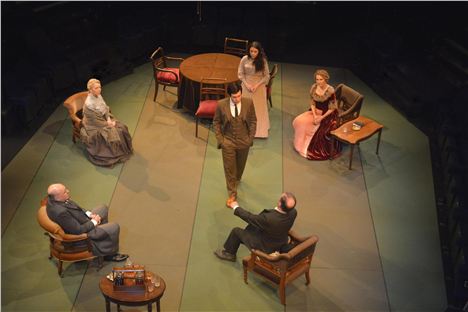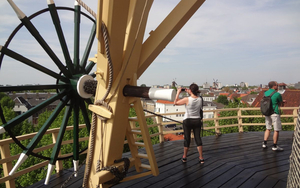BOLTON’s Octagon and Oldham’s Coliseum Theatres have joined forces to present a revival of the sturdy and once-controversial play, Hindle Wakes, by local playwright Stanley Houghton, a member of the Manchester School, also well known for the highly successful Hobson’s Choice by Harold Brighouse.
Hindle Wakes was first performed at Annie Horniman’s Gaiety Theatre on Peter Street, eliciting a storm of protest, letters to The Times, and an attempt by Oxford’s Vice Chancellor to ban its performance in the city.
Hindle Wakes, first performed in 1912, provides a welcome context for the range of World War 1 dramas. Set in the fictional Lancashire mill town, Hindle, from which nobody travels further than Llandudno and Blackpool, the focus of the respectable folk is respectability.
Bolton’s production is performed fully in the round and the clean but shabbily sparse dining room of the Hawthorn’s terrace provides a fairly depressing start to the evening. It’s quickly lifted by the return of Fanny to her anxiously awaiting parents. Where’s she been? Did she return via Manchester or the more direct route? Fanny’s lies don’t last and her parents discover, to their shame, the truth about her weekend. With a man. In Llandudno. Fanny isn’t shamed though, and that’s even worse.
To deepen the shame, the man in question is Alan Jeffcote, son of Nathaniel Jeffcote, long-term friend of Fanny’s father Christopher and now a self-made man and mill owner. Christopher will need to have words.
The remaining scenes cover expected ground, as the parents’ expectations of imminent marriage are presented; and some unexpected ground, as Fanny proves to be the mistress of her own affairs.
Houghton is a skilled writer. He can do banter. He can do Lancashire dialect. He can do conversations where people hide behind words and where the truth is slowly, and often amusingly, revealed. Is that Lancashire too?
In a play that centres on a strong-minded woman, the most entertaining scenes are the one-to-one male conversations, particularly between Nathaniel (James Quinn) and Christopher (Russell Richardson), and Nathaniel and Sir Timothy Farrar (Colin Connor), another self-made man.
The higher confidence levels of Sir Timothy and Mr Jeffcote, both have wealth but neither has a wayward daughter, provide James Quinn and Colin Connor plenty of opportunities for genuine laughs without losing sight of the underlying fear that their earlier humble beginnings will expose them to ridicule or even a return to humbler life. As Jeffcote says, ‘It can be three generations from clogs to clogs.’
Natasha Davidson has a luminous quality as Fanny Hawthorn. There’s an underlying, growing confidence and quiet enjoyment as she realises the pleasure of taking control of her life.
Hindle Wakes was first performed at Annie Horniman’s Gaiety Theatre on Peter Street, eliciting a storm of protest, letters to The Times, and an attempt by Oxford’s Vice Chancellor to ban its performance in the city. The Lancashire vowels caused a storm too when performed on southern stages.
The Octagon’s David Thacker treats the play with a lightness and a respect for tradition. Plays of this age can appear as merely period pieces. That this does not is due not only to the quality of the writing and acting talent, but also to the directorial approach; occasionally a modern perspective intrudes upon older pieces.
This production succeeds because it is played completely straight, the cast entirely true to their characters. In 1912 women were agitating for the vote, some were pursuing their own careers, some were behaving as if sexual freedom was their right too, and some even wanted all three; there was a mix of motives inhibiting the change, and nobody knew just what awaited them.
Hindle Wakes is at the Octagon Theatre Bolton from Thursday 19 February – Saturday 21 March 2015.
It then tours to The Dukes Lancaster from 24 March – 28 March, and Oldham Coliseum Theatre 16 April – 2 May.














